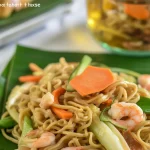Pancit Habhab
A delicious Filipino noodle dish traditionally eaten off banana leaves, featuring savory pork, fresh vegetables, and a tangy sauce.
Servings: 4 servings
Calories: 400kcal
Ingredients
For the Noodles
- 8 oz Lucban miki noodles Can substitute with pancit canton or egg noodles if unavailable.
For the Sauce & Toppings
- 1 lb pork belly Sliced thin for quick cooking.
- 4 cloves garlic Minced.
- 1 medium onion Chopped.
- 1 medium carrot Sliced into thin strips.
- 1 medium sayote Optional, sliced.
- 2 tbsp soy sauce
- 1 tbsp oyster sauce
- 1 cup chicken broth Or water.
- to taste chicharron For topping.
- to taste suka (vinegar) For serving.
- to taste chopped chilies or calamansi Optional, for added flavor.
Instructions
Preparation of Noodles
- Boil a pot of water, add a bit of salt, and cook the Lucban miki noodles for about 3 minutes until soft but slightly firm.
- Rinse noodles with cold water to prevent them from becoming gloppy.
Cooking the Sauce
- In a pan, brown the pork belly until crispy and then set aside some for topping.
- In the same pan, sauté the garlic and onions for about 1 minute, then add in the carrots and sayote.
- Quickly fry the vegetables, then add in soy sauce, oyster sauce, and some chicken broth.
- Return the browned pork to the pan and let it simmer.
- Toss the cooked noodles into the pan and stir until the sauce coats every noodle.
Serving
- Lay a wide piece of banana leaf flat on a plate and pour a good amount of noodles in the center.
- Serve with suka, chopped chilies, calamansi, and more chicharron for garnish.
- Encourage guests to eat directly off the banana leaf without utensils.
Notes
This dish is all about enjoying a communal experience; the more the mess, the more fun! Adjust the vinegar to taste, but use sparingly to avoid overpowering the dish.
